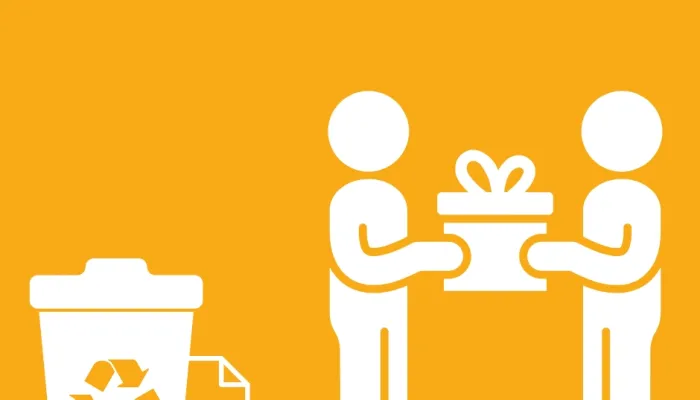Upcycle gifts & use recycled wrapping
Gifting sustainably doesn’t mean compromising on thoughtfulness or creativity — quite the opposite. By choosing to upcycle and wrap gifts in recycled or reusable materials, you can reduce waste and make your presents truly one-of-a-kind.
Best practice
- Upcycle gifts: Repurpose materials or objects into gifts — e.g. turn an old glass jar into a candle holder, or make a bird box from scrap wood.
- Homemade ideas: Try gifting homemade chutneys, infused oils, or pressed flower art — all made from items you might already have at home.
- Eco wrapping: Use newspaper, fabric offcuts (furoshiki wrapping), or brown paper tied with string. Avoid glitter or foil wrapping, which can’t be recycled.
- Reuse: Keep gift bags, ribbons, and boxes to use again.
Why it matters
Millions of rolls of unrecyclable wrapping paper go to landfill each year. Reusing and repurposing materials helps reduce carbon emissions from production and waste processing.
Switch to eco-friendly cleaning products
Conventional cleaning products often contain harmful chemicals that can pollute waterways and harm aquatic life. Eco-friendly alternatives are safer for both your household and the environment.
Best practice
- Choose certified products (look for the EU Ecolabel, ECOCERT, or Cruelty-Free symbols).
- Use refill stations or concentrate sachets to reduce plastic waste.
- Try natural ingredients like white vinegar, lemon juice, and bicarbonate of soda for everyday cleaning.
Tip:
Join or start a local refill group to bulk-buy sustainable cleaning products and reduce packaging waste.
Why it matters
Common cleaning chemicals can persist in the environment and impact wildlife. Reducing their use at the source protects rivers, oceans, and soil health.
Limit outdoor lighting
Outdoor lighting, especially when left on unnecessarily, contributes to energy consumption and light pollution — both of which affect nocturnal wildlife.
Best practice
- Use motion sensors or timers to limit unnecessary lighting.
- Choose solar-powered or low-energy LED lights.
- Shield lights downward to minimise disturbance to wildlife, particularly insects and bats.
Why it matters
Artificial light disrupts the natural behaviours of pollinators, birds, and other nocturnal species.
Install a bidet at home to reduce paper waste
Switching to a bidet can significantly cut down on toilet paper use — a resource-intensive product with high water, energy, and deforestation costs.
Best practice
- Consider a bidet attachment or handheld sprayer — these are affordable, easy to install, and don’t require major plumbing changes.
- Choose models that use minimal water and allow temperature control.
Why it matters
Global toilet paper consumption drives unsustainable logging in old-growth forests. Reducing demand helps preserve critical carbon sinks and wildlife habitats.
Adopt water saving devices/practices at home
With increasing pressure on water resources in the UK, using water wisely is a key step toward climate resilience and ecosystem health.
Best practice
- Fit devices: Install tap aerators, dual-flush toilet converters, and water-saving shower heads (many available free from water companies).
- Collect rainwater: Use water butts for garden use — plants prefer untreated rainwater.
- Change habits: Turn off taps while brushing teeth, wash full loads in the dishwasher, and shorten showers by a minute or two.
Why it matters
England could face significant water shortages by 2050. Saving water helps keep rivers flowing and wetlands thriving — vital habitats for amphibians, birds, and aquatic plants.

